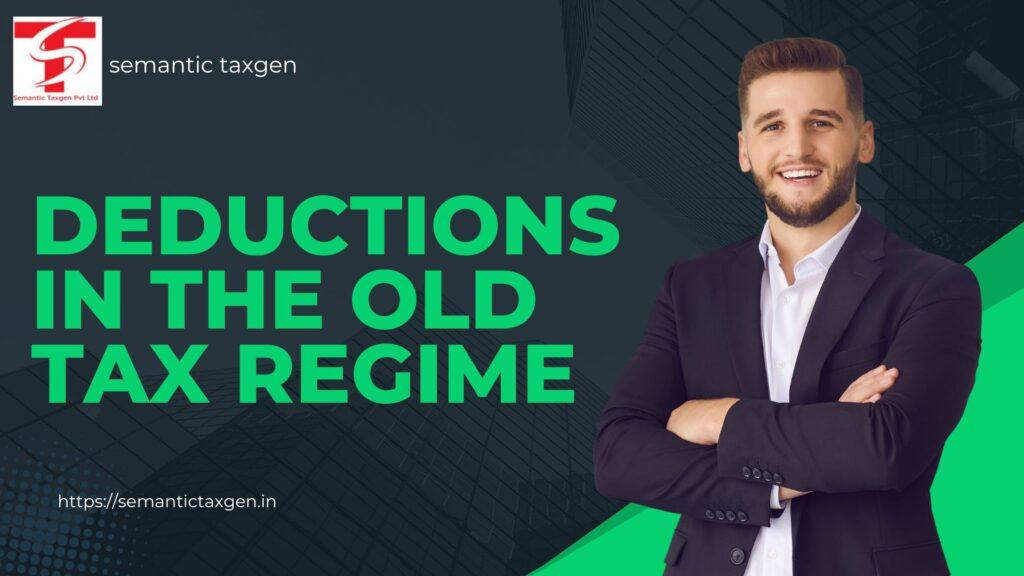
The Indian taxes structure has evolved many times with the multiple tax systems having been implemented in order to enhance the ease of tax compliance. one such regime is the old or the previous tax regime which provides innumerable deductions to the individual with an aim to bring down his or her taxable income. To that end, this article focuses on the generation of the deductions available under the old tax regime in order to shed more light on them and their impact on the taxpayers.
The old tax system thus employed what is known as tax deductions, whereby tax payers could offset their taxes by providing proof that they had incurred expenses in certain categories. The new tax regime on the one hand, allows the assessment of the income at lower rates of taxes but restricts the possibilities of saving taxes through deductions; the old regime on the other hand affords more opportunities for tax savings through tax deductions.
– Under this section, taxpayers can claim deductions up to ₹1.5 lakh by investing in various instruments such as:
– Public Provident Fund (PPF)
– Equity Linked Saving Schemes (ELSS)
– National Savings Certificate (NSC)
– Tax-saving Fixed Deposits (FDs)
– Life Insurance Premiums
– Such schemes are Sukanya Samriddhi Account, etc.
– These investments not only lower the taxable amount but also increase the savings, thereby encouraging the process of accumulation and long-term investments.
– This section is to claim deductions of premiums paid for health insurance policies for the employee, spouse, children, and parents.
– The donations allowed are up to Rs 25000 to self, spouse and children, whereas up to Rs 25000 for premium paid towards parents.
– However, the limit in the case of the senior citizens it is increased to ₹ 50000 and thus hurting the tax reforms significantly.
– Candidates availing interest on education loans for the purpose of pursuing higher studies can claim afford of this section.
– Amounts paid during the financial year towards interests can be fully written off from the income with no restriction as to the limit.
– Through this provision, education financing is promoted and the concern of the burden which. setLayouts for the students and their families is relieved.
– The main area of interest provided in this section is that the homeowners can claim deductions for the interest being paid for home loans.
– In the case of self-occupied properties, only ₹ 2 lakh of interest can be claimed as a deduction from the total income and in the case of let out or deemed let out properties, no restrict ion exists with regard to the amount of interest paid or accrued in forwarding their returns.
– Also, deductions up to one hundred rupees have been allowed from the gross. Up-to five lakh can be availed under Section 80C on the repayment of principle amount.
– Exemptions according to the section 80G of the Income Tax Act for donations given to charitable organizations, and the sections 80TTA and 80TTB for interest on saving account and other saving account deposit for senior citizen respectively, and section 80U for expenses incurred for medical treatment of certain diseases or ailments.
It implies that the tax payers have to make elaborate arrangements to ensure that they claim all allowable deductions under the old tax regime in order to reduce their tax bill as much as possible. Since expenditures can be claimed against specific categories of income for purposes of arriving at the adjusted gross income, taxpayers can well control their investment and expenditure outgoings through various investment and expenditure plans with a view of reducing maximum possible income against which taxes has to be paid.
The key fact, which is associated with deductions, is that they help taxpayers to reduce their tax burden significantly, however, the potential for investment is usually not limitless and depends significantly on the financial needs and risks of taxpayers. Just as it is important to coordinate between the ideal tax-saving instrument and its other fiscal goals, it is also important to coordinate financial goals in general.
The old tax regime has a workable structure on how taxpayers could fold their bills into impact through the deductions allowable under the law. Since there are different types of deductions which contain the following; it is wise to learn how to maneuver the tax regime and match them to the individual’s budgetaries thereby ensuring the most efficient way achieve the investment plans.
Therefore, the old tax system provides a countless number of deductions that treatment can save an individual quite a lot of money. In a careful selection of these deductions, the taxpayers are also able to avoid or reduce their tax payment while at the same time promoting the development of fiscal stability in the long run. Consequently, there is the need for individuals to take time and look at the available deductions they could be entitled to and if possible seek advice from an expert and then take the necessary steps required and ensure that one benefit from the best tax regime that was there before.
To Receive or Inquire about the NGO Taxation services check out our website: https://ngopilot.in/
DISCLAIMER: The information provided in this article is intended for general informational purposes only and is based on the latest guidelines and regulations. While we strive to ensure the accuracy and completeness of the information, it may not reflect the most current legal or regulatory changes. Taxpayers are advised to consult with a qualified tax professional or you may contact to our tax advisor team through call +91-9871990777 or info@semantictaxgen.in the appropriate government authority to verify the accuracy of the information and to obtain advice on their specific tax situations.
© 2013-24 Semantic Taxgen Pvt Ltd - All Rights Reserved